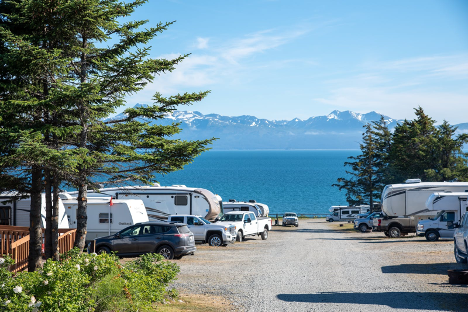Hitting the Road: Travel Trailer or Motorhome?
Sep 26, 2023 12:32
The allure of the open road has never been stronger, especially in an age where flexible lifestyles and the quest for unique experiences dominate our choices. The RV industry, responding to this wanderlust, offers a myriad of options for those yearning to explore, with travel trailers and motorhomes being two of the most popular choices among adventurers.
As more people consider embarking on RV travels, a common conundrum arises: should one invest in a travel trailer or a motorhome? Each has its distinct set of advantages, challenges, and comforts. This article seeks to shed light on these two options, aiming to help potential travelers discern which might be the best fit for their personal aspirations. Whether you're dreaming of weekend getaways or extended cross-country adventures, understanding the nuances between these two options can be the key to a rewarding RV experience.

What is a Travel Trailer?
Travel trailers, often emblematic of road adventures, are non-motorized towable RVs attached and towed by a separate vehicle, be it a car, truck, or even, in some cases, a motorcycle. They come in a diverse range of sizes and layouts, ensuring that there's likely a model suited for almost every type of traveler and family size. Key types include teardrop trailers, perfect for solo or couple travelers; fifth-wheel trailers, which connect to a truck via a special in-bed hitch; and pop-up campers that can expand when stationary to offer more living space and then collapse for easier transport.
Unlike motorhomes where the driving and living compartments are integrated, travel trailers provide a distinct separation between the vehicle and the living space. This design ensures that travelers can unhitch their living quarters once they reach a destination, allowing for independent use of the towing vehicle. For those in the market, searching for campers for sale can unveil a plethora of choices. Whether you're aiming for simplicity or luxury, the world of travel trailers offers options spanning from basic sleeping accommodations to lavish models equipped with modern amenities similar to those found in stationary homes.
Advantages and Disadvantages of Travel Trailers
One of the most significant advantages of travel trailers is their cost-effectiveness. Generally, they are more affordable than motorhomes, making them an attractive choice for those on a tighter budget. The flexibility they offer is another major draw; once a travel trailer is unhitched, the towing vehicle can be used separately, providing mobility without the need to pack up your living space. This is especially beneficial when making quick trips into town or exploring local sights. With a vast range of sizes available, from compact teardrop trailers to expansive fifth-wheel models, there's likely a travel trailer to match each individual's space requirements and amenity preferences. Their separated nature often means maintenance can be easier and less expensive, as issues with the vehicle or trailer can typically be addressed independently.
Travel trailers are not without their challenges. A primary consideration is the necessity of a tow vehicle with adequate power and towing capacity, which might entail an additional investment for some. Maneuvering, especially reversing with a trailer, can pose a learning curve for beginners, potentially making parking and setting up camp more time-consuming initially. Additionally, while many travel trailers are replete with features, they may lack some of the more luxurious amenities found in high-end motorhomes. This could mean making some compromises on comfort or conveniences, especially in smaller or more budget-friendly models.
What is a Motorhome?
Unlike travel trailers, motorhomes combine the driving and living compartments into one integrated unit. They're often characterized by their classification system: Class A, Class B, and Class C. Class A motorhomes are the largest and most luxurious, often resembling buses in design, equipped with expansive living areas and a wealth of amenities. Class B motorhomes, colloquially known as "camper vans," are the smallest of the trio, built on van chassis and offering a more compact living environment. Class C motorhomes strike a middle ground, built on truck or van chassis, and are recognizable by the cab-over profile, providing additional sleeping or storage space.
Motorhomes offer the promise of a home on wheels, allowing travelers to journey with the conveniences of home right behind the driver's seat. With an all-in-one design, motorhomes make transitioning from travel mode to rest mode seamless. Whether you're parking overnight at a campsite, taking a quick roadside break, or setting up for an extended stay, everything you need is within arm's reach.
Advantages and Disadvantages of Motorhomes
One of the primary advantages of motorhomes is the sheer convenience they provide. The integrated design means that travelers can easily transition between driving and living without the need to exit the vehicle, making stops and rests both simple and swift. Motorhomes also often come with a broader array of built-in amenities. These can include larger kitchen areas, more expansive bathrooms, and additional luxuries such as built-in entertainment systems or even washers and dryers. Many motorhomes come with built-in generators, allowing for greater flexibility in terms of boondocking or camping without traditional hookups.
Owning a motorhome does come with its set of challenges. Generally, they are more expensive to purchase than travel trailers, and given the integration of the vehicle and living space, maintenance or repair issues can mean that your entire home is temporarily out of commission. Maneuverability can also be a concern, especially with larger Class A models, making tight spaces or crowded areas more challenging to navigate. In terms of fuel efficiency, motorhomes, particularly the larger models, tend to be less economical than many towed options.
The choice between a travel trailer and a motorhome hinges on individual preferences, budget, and travel aspirations. Both options offer unique benefits and come with their own sets of challenges. By understanding the nuances of each and assessing your personal requirements, you can make an informed decision that best enhances your RV adventures.







































































